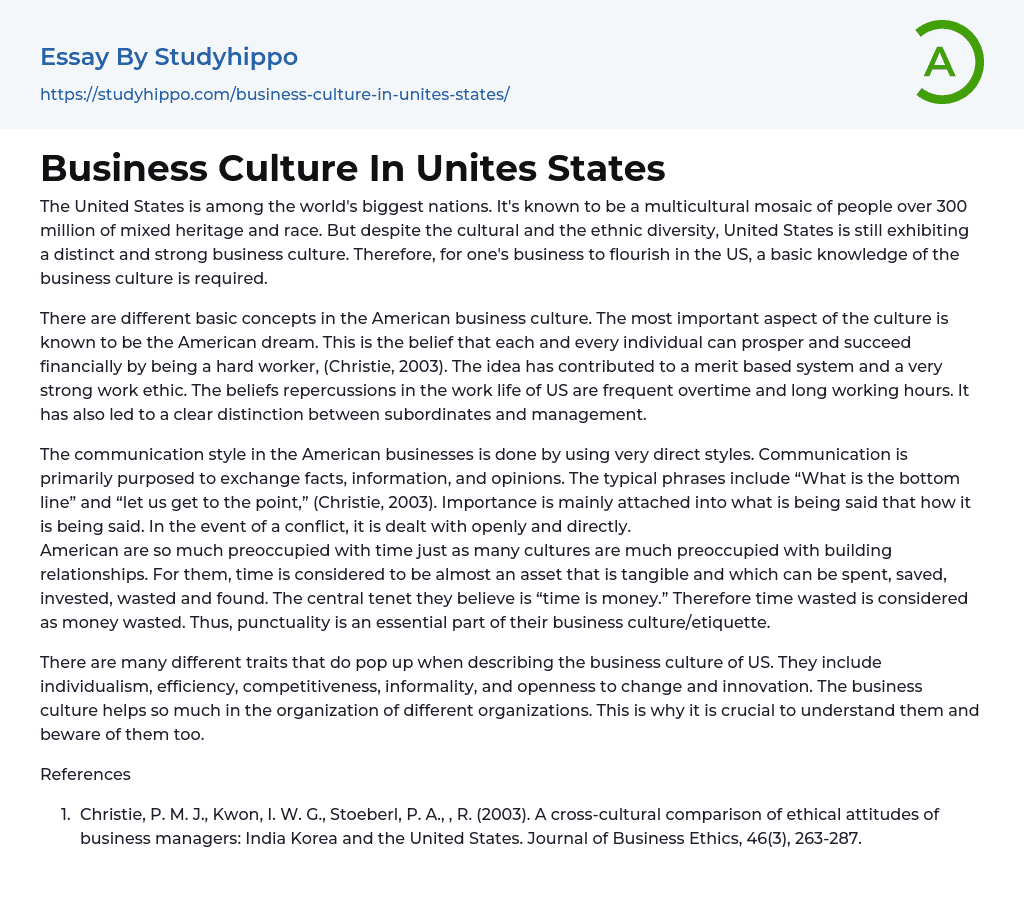The United States is among the world's biggest nations. It's known to be a multicultural mosaic of people over 300 million of mixed heritage and race. But despite the cultural and the ethnic diversity, United States is still exhibiting a distinct and strong business culture. Therefore, for one's business to flourish in the US, a basic knowledge of the business culture is required.
There are different basic concepts in the American business culture. The most important aspect of the culture is known to be the American dream. This is the belief that each and every individual can prosper and succeed financially by being a hard worker, (Christie, 2003). The idea has contributed to a merit based system and a very strong work ethic. The beliefs repercussions in the work life of US are frequent overtime and long working hours. It has also
...led to a clear distinction between subordinates and management.
The communication style in the American businesses is done by using very direct styles. Communication is primarily purposed to exchange facts, information, and opinions. The typical phrases include “What is the bottom line” and “let us get to the point,” (Christie, 2003). Importance is mainly attached into what is being said that how it is being said. In the event of a conflict, it is dealt with openly and directly.
American are so much preoccupied with time just as many cultures are much preoccupied with building relationships. For them, time is considered to be almost an asset that is tangible and which can be spent, saved, invested, wasted and found. The central tenet they believe is “time is money.” Therefore time wasted is considered as money wasted
Thus, punctuality is an essential part of their business culture/etiquette.
There are many different traits that do pop up when describing the business culture of US. They include individualism, efficiency, competitiveness, informality, and openness to change and innovation. The business culture helps so much in the organization of different organizations. This is why it is crucial to understand them and beware of them too.
References
- Christie, P. M. J., Kwon, I. W. G., Stoeberl, P. A., , R. (2003). A cross-cultural comparison of ethical attitudes of business managers: India Korea and the United States. Journal of Business Ethics, 46(3), 263-287.
- Accounting essays
- Marketing essays
- Automation essays
- Business Cycle essays
- Business Model essays
- Business Operations essays
- Business Software essays
- Corporate Social Responsibility essays
- Infrastructure essays
- Logistics essays
- Manufacturing essays
- Multinational Corporation essays
- Richard Branson essays
- Small Business essays
- Cooperative essays
- Family Business essays
- Human Resource Management essays
- Sales essays
- Market essays
- Online Shopping essays
- Selling essays
- Strategy essays
- Management essays
- Franchising essays
- Quality Assurance essays
- Business Intelligence essays
- Corporation essays
- Stock essays
- Shopping Mall essays
- Harvard Business School essays
- Harvard university essays
- Trade Union essays
- Cooperation essays
- News Media essays
- Waste essays
- Andrew Carnegie essays
- Inventory essays
- Customer Relationship Management essays
- Structure essays
- Starting a Business essays
- Accounts Receivable essays
- Auditor's Report essays
- Balance Sheet essays
- Costs essays
- Financial Audit essays
- International Financial Reporting Standards essays
- Tax essays
- Accountability essays
- Cash essays
- Principal essays




